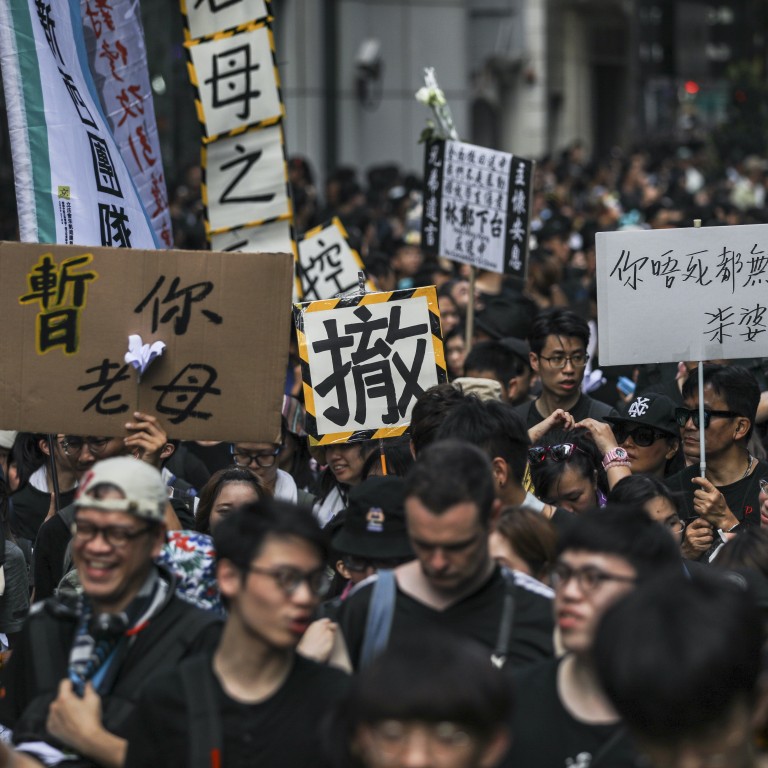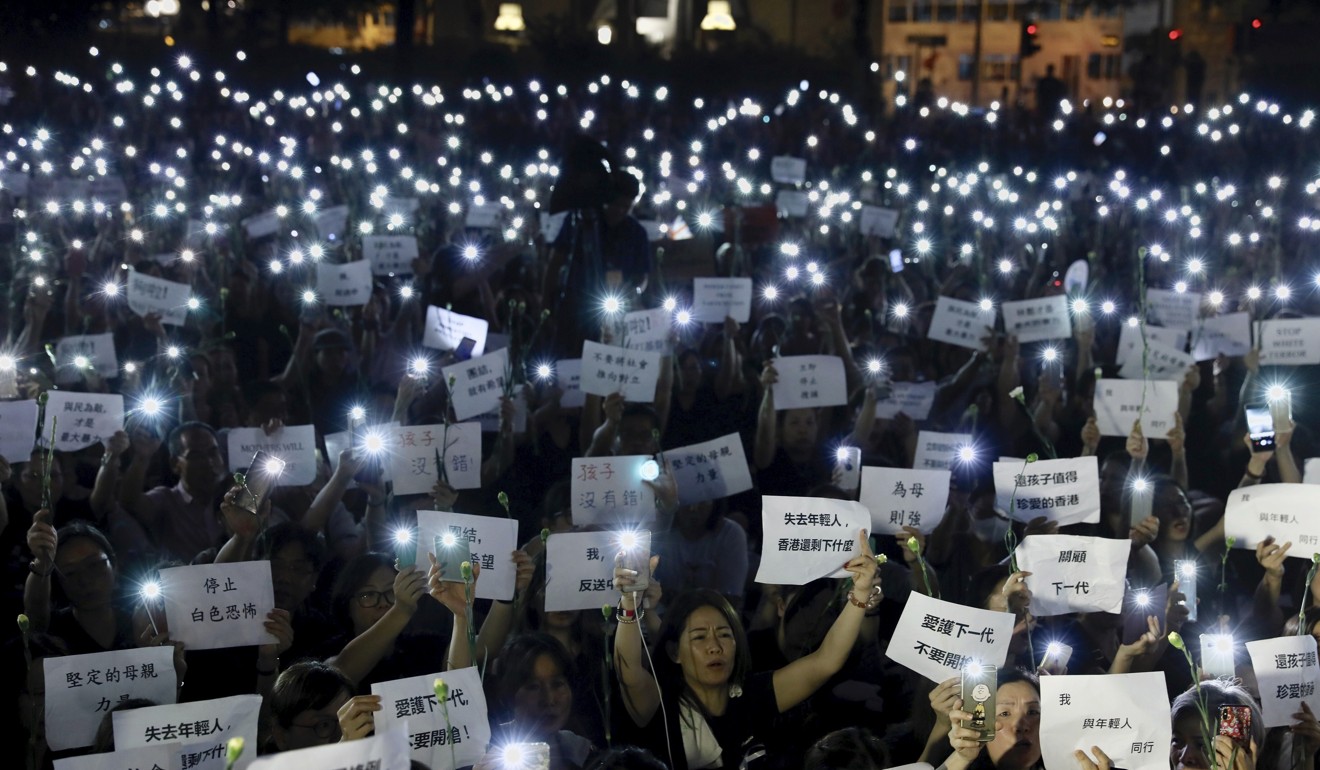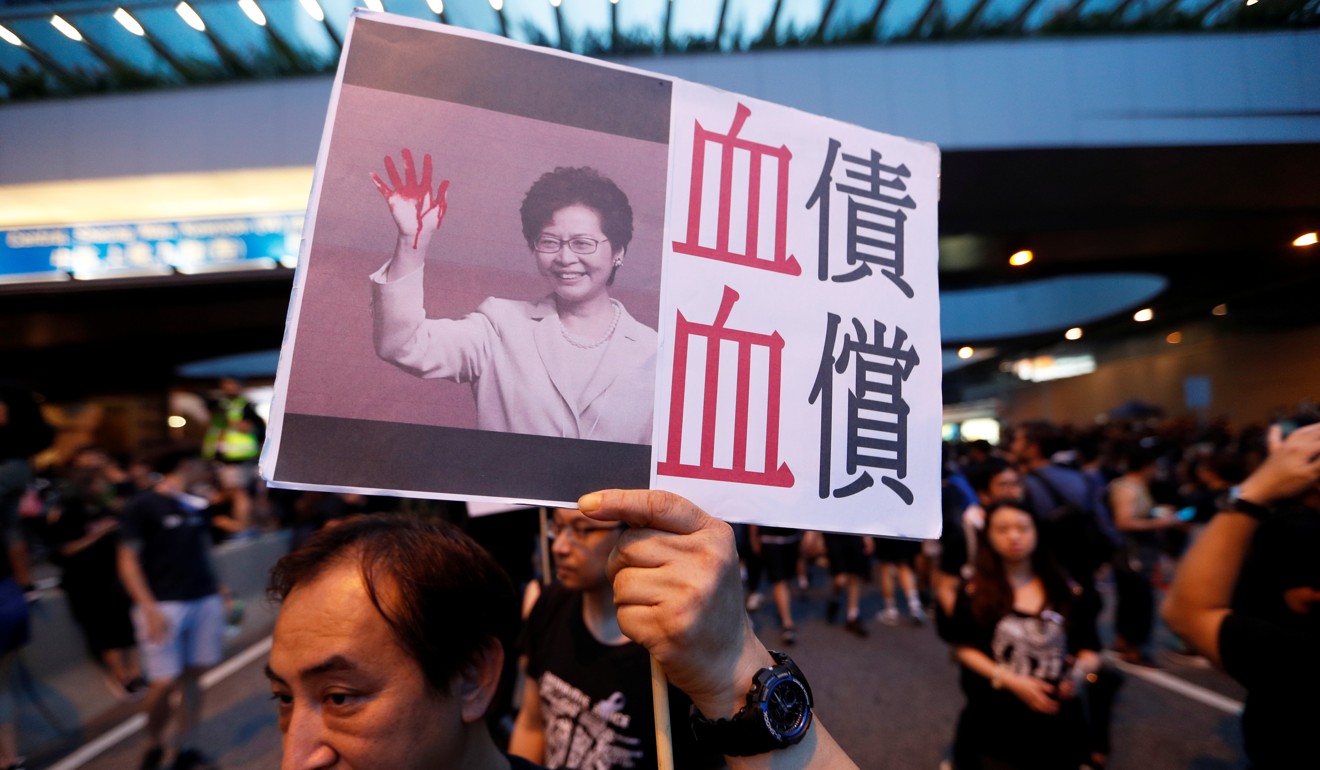
US performs a tricky balancing act amid drama over Hong Kong extradition bill protests
- Washington’s main leverage has been a threat to modify Hong Kong’s special economic and trade status and its preferential access to US markets
- While US President Donald Trump has so far taken a restrained stance, members of Congress have reacted more forcefully
The Trump administration’s measured approach over the past week as massive protests built in Hong Kong, forcing its government to back down over a proposed extradition law, reflects a delicate balancing act. At issue for the United States has been how to maintain pressure on China without unduly penalising the Hong Kong people or pushing an angry Beijing too far.
On Sunday, a crowd estimated at up to 2 million people took to the streets, the third protest in a week, despite Hong Kong Chief Executive Carrie Lam Cheng Yuet-ngor’s move a day earlier to suspend the controversial bill. As the numbers swelled on Sunday, Lam apologised in a statement “in the most sincere and humble way”, capping a historic week that started with the gathering of an estimated 1 million protesters, until then the biggest in the city’s history.
Despite giving ground on the bill and apologising, she still has not ruled out reintroducing it later. That has left Hong Kong critics vowing to keep the pressure on until it is shelved completely, amid fears it could be used to extradite residents to mainland China for contrived political or business offences.
The unusually restrained American stance taken by US President Donald Trump, a man not generally known for treading carefully, appears to have paid off, at least so far. While the administration caught some early flak for meddling in China’s internal affairs, it avoided becoming the main focus of Beijing’s ire even as the main US objective was achieved with the law’s suspension.
Trump’s only significant comment came midweek when he said he expected Beijing and Hong Kong would “be able to work it out”.
“There’s a fundamental balance the administration sought to reach,” said Michael Hirson, head of the China practice at Eurasia Group and the former top US Treasury official in Beijing. “The administration has wanted to put pressure on Beijing.
“But if they took very punitive measures, it would have weakened Hong Kong, making Hong Kong more dependent on China economically and hurting Hong Kong’s voices supporting democracy.”
If the US decided to be much more proactive regarding Hong Kong, absolutely, the leadership in Beijing would be extremely angry
Washington’s main leverage has been a threat to narrow or strip the territory’s special economic and trade status and its preferential access to US markets by revising the United States-Hong Kong Policy Act of 1992.
But it’s a rather blunt tool that would hurt the very Hong Kong residents Washington hoped to support. Any precipitous threat or outright move also risked putting the Hong Kong dollar under pressure, further damaging the already shaky Chinese economy and pushing Beijing’s displeasure to a code red.
“This would truly be the nuclear option,” said Dali Yang, a political-science professor and expert on the Chinese leadership at the University of Chicago. “The financial shock would be very significant and Beijing was already complaining about American interference. If the US decided to be much more proactive regarding Hong Kong, absolutely, the leadership in Beijing would be extremely angry.”

The US Congress showed much less restraint. Midweek, a group of senators – Marco Rubio of Florida, Ben Cardin of Maryland, Jim Risch of Idaho and Bob Menendez of New Jersey – introduced legislation to periodically review Hong Kong’s status and ensure it remains sufficiently autonomous to continue receiving special US trading benefits.
The bipartisan move, by a Congress normally beset by partisan division, set off alarm bells in Hong Kong and China.
Other provisions of proposed US legislation would monitor and otherwise help ensure that China does not use Hong Kong as a base for espionage against foreigners or as a conduit to evade duties, export controls or sanctions, especially involving Iran or North Korea. And it would apply sanctions to anyone found abducting booksellers, journalists or activists to China.
Beijing slams Nancy Pelosi for condemning Hong Kong extradition bill
As global opposition to the extradition bill mounted – with some 29 cities worldwide holding demonstrations supporting the protesters, echoed by a joint statement from the Canadian and British foreign ministers – US House Speaker Nancy Pelosi weighed in forcefully.
Passage of the extradition bill would leave the Congress “no choice” but to reassess whether Hong Kong is “sufficiently autonomous” under the “one country, two systems” framework, the powerful California congresswoman said. The extradition measure “chillingly showcases Beijing’s brazen willingness to trample over the law to silence dissent”, she added.
Beijing responded swiftly and sharply to this perceived threat to its sovereignty.
“China expresses strong dissatisfaction and resolute opposition to some people in the US for making irresponsible and incorrect remarks,” Chinese foreign ministry spokesman Geng Shuang said. “The affairs of Hong Kong are purely the internal affairs of China.”
Fiery rhetoric aside, Beijing was engaged in its own balancing act as it weighed getting the extradition law passed without letting its fingerprints become too obvious. China sees the extradition architecture as a way to gain legal cover amid global criticism for abducting people extrajudicially from the streets of Hong Kong.
China was also trying to safeguard its global reputation as its massive Belt and Road Initiative gained momentum by ensuring that Lam rather than Beijing absorbed most of the popular anger, analysts said.
“The line from Beijing is that Lam had room for discretion, and I think this is likely true,” Yang said. “She was eager to push the extradition bill, thinking that it would please Beijing while also allowing her to show her strong leadership.”
This has all unfolded against the backdrop of a costly US-China trade war as the two giants impose tariffs on hundreds of billions of dollars’ worth of goods. As the ill will has spread, Washington and Beijing have tightened restrictions on companies, visas and people-to-people exchanges.
Did police use excessive force to deal with Hong Kong protests?
While chances of an immediate deal are limited given tense relations and lack of preparation, the world is waiting to see whether Trump and President Xi Jinping make any progress when they meet at the G20 meeting in Japan late this month. Trump has repeatedly threatened to impose 25 per cent tariffs on another US$300 billion of Chinese imports in a bid to force Beijing’s hand.
China is also feeling economic pressure. In recent weeks, its industrial production has hit its slowest pace since the 2009 financial crisis as export shipments weakened, factory investment plunged and car sales in the January-May period fell 15 per cent from a year earlier.
“Property has been the only bright spot in the economy so far this year,” Larry Hu, senior China economist with the Macquarie Group wrote in a recent report. “But it also started faltering lately.”
It’s clear that the leadership in Beijing and Hong Kong badly underestimated the depth of displeasure over the extradition bill. What might have ultimately tipped the balance in their decision to back down were reports of Hong Kong tycoons transferring assets offshore and related concerns among Chinese elites that the chaos was jeopardising their personal wealth, analysts said.
“Many of the well-connected in Beijing have significant assets in Hong Kong,” Yang said. “Clearly Hong Kong’s chief executive misjudged public sentiment, that it’s been so strong. And in her interviews, it was as if she were disciplining children. It was a very paternalistic stance.”
March of 2 million forces apology out of Carrie Lam over bill
Another key factor was the breadth of opposition to the extradition law especially in the business community, a key constituency in the commercially driven city.
Even as US senators prepared legislation, members of the influential American Chamber of Commerce in Hong Kong were on an annual trip to Washington to meet key congressional and business leaders.
Driving their opposition to the extradition law are very personal fears that any corrupt Chinese official or tycoon with a grudge could drag foreign executives off to the mainland.

Chinese courts are controlled by the Communist Party, decisions are often opaque and defendants in “sensitive” cases held up to 16 years without trial, according to New York University law professor Jerome Cohen.
“Continued erosion of the one country, two systems framework puts at risk Hong Kong’s long-established special status in international affairs,” a US State Department official said on Friday.
“We are also concerned that the amendments could damage Hong Kong’s business environment and subject our citizens resident in or visiting Hong Kong to China’s capricious judicial system.”
Trump to raise Hong Kong extradition protests with Xi at G20
Calculations in the future for Hong Kong, Beijing and the US will hinge on whether Lam’s retreat over the controversial bill is a temporary reset or an outright defeat.
Beijing and its pro-China Hong Kong allies must weigh whether their climbdown makes their leadership look weak, further emboldens protesters, threatens Communist Party control and affects its global reputation.
“Beijing will be worried that this encourages more protests,” Hirson said.
On the US side, while it is often difficult to find consistency in the Trump administration amid high turnover, mixed messages and poor inter-agency coordination, Washington is expected to continue moving slowly and carefully, if at all, on revising the 1992 act.
“I wouldn’t want to be in the shoes of anyone trying to figure out what this administration is thinking, if anyone can,” said Lawrence Reardon, a China and Hong Kong expert at the University of New Hampshire.
“But pushing this would endanger the trading relationship given that Hong Kong has been an important entrepot for everyone.”
China summons US envoy in protest over Hong Kong extradition bill remarks
Congress is expected to make noise, but the legislation will likely die a quiet death, in line with most proposed US legislation, barring some violent or deadly crackdown.
“Unless we start to see the PLA marching in Shenzhen toward the New Territories, that is,” Reardon said, referring to the People’s Liberation Army. “That would be the last straw.”

